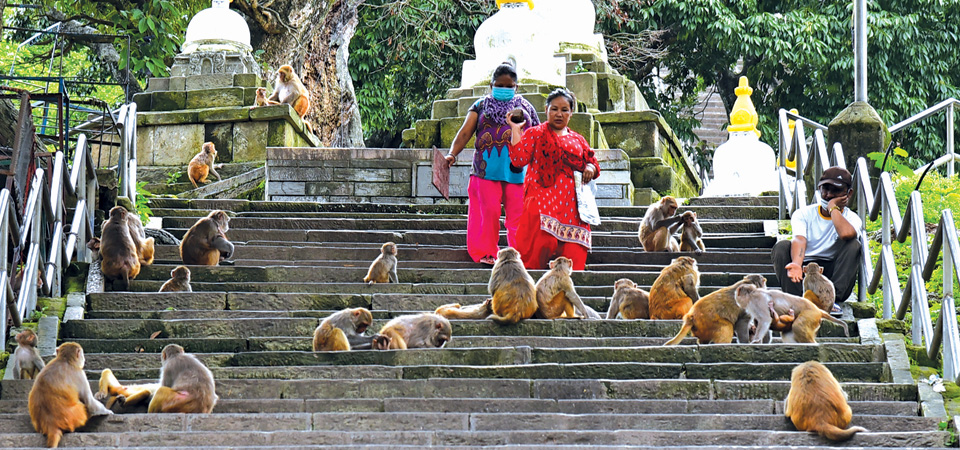Monkeys in Swoyambhu are well taken care of

By Sushma Maharjan
Kathmandu, Mar. 19: It is impossible to imagine Swoyambhu without monkeys – after all, the stupa is even called the Monkey Temple by tourists. At every corner and every turn, visitors to this religious shrine are greeted by monkeys. And, according to Ashok Buddhacharya, secretary general of the Federation of Swoyambhu Management and Conservation (FSMC), these monkeys are well taken care of.
Buddhacharya said that more than 1,000 monkeys are living in the forest of Swoyambhu. The organsation feeds grams and chick peas to them every day and has built water ponds in the area for the monkeys to take a bath during summer.
They also started plantation in the area since 1995. In June 2019, they planted around 220 saplings. It has become the good stay for the monkeys. Since the forest has thickened it has been the proper habitat for the monkeys, said Bddhacharya.
In the past when a monkey attacked a human, the organisation had conducted the health check-up of the monkeys by primatologist Dr. Mukesh Chalise. Monkeys were not found with any major health issues when they were examined, said Buddhacharya. There are no health issues in the monkeys.
In the past, people used to feed the leftover food to the monkeys, which upset the taste bud of the monkeys. For the better health of the monkeys, the organisation created awareness about monkeys leaving their habitat for human food and also placed signage not to feed leftover food to the monkeys. This helped the monkeys to stay within the forest and eat there.
The monkeys here are not aggressive, and they don’t attack humans until they are attacked first. They get proper food and water. They are just living here. They don’t do much property damage. Sometimes they break the branches of the trees and visit the nearby areas. The organisation works on how to rebuild if damages are made.
There are no complaints against monkeys so far. Actually, monkeys are worshiped as deity. They are taken as the incarnation of Hanuman (the monkey god) and also as the children of Ajima Goddess. Acknowledging the nature of monkeys, people don’t take it as a big issue.
Budhhacharya added that the fund is collected from the ticket revenue. For now, it is not that difficult to manage the monkeys residing here. But if they get more funding, then they can run a health campaign for monkeys too.
Most of the monkeys die during the winter. It's hard for the old monkeys to adjust with low temperature and fight for the food during winter. He also said the bodies of monkeys are taken care of by the organisation.
A local Urusha Khanal said monkeys often come to their houses. They come around 2-3 times a week. If the windows and doors are left open, they scatter the food and stuffs. They break down the crops too. They even take away the foods but they don’t do much property damage. I think they just come here for the food.
Another local Rukesh Lama said, "We are used to the monkeys. I have seen monkeys coming to our houses since my childhood. They sometimes mess up our kitchen, and we can't keep anything left open on the terrace. Sometimes they get on the automobiles too. They do the physical damage."
When the question was asked if he had made any complaint about the issue, he said it has become the lifestyle of the people living nearby Swoyambhu. It is not an issue.
Recent News

Do not make expressions casting dout on election: EC
14 Apr, 2022
CM Bhatta says may New Year 2079 BS inspire positive thinking
14 Apr, 2022
Three new cases, 44 recoveries in 24 hours
14 Apr, 2022
689 climbers of 84 teams so far acquire permits for climbing various peaks this spring season
14 Apr, 2022
How the rising cost of living crisis is impacting Nepal
14 Apr, 2022
US military confirms an interstellar meteor collided with Earth
14 Apr, 2022
Valneva Covid vaccine approved for use in UK
14 Apr, 2022
Chair Prachanda highlights need of unity among Maoist, Communist forces
14 Apr, 2022
Ranbir Kapoor and Alia Bhatt: Bollywood toasts star couple on wedding
14 Apr, 2022
President Bhandari confers decorations (Photo Feature)
14 Apr, 2022











